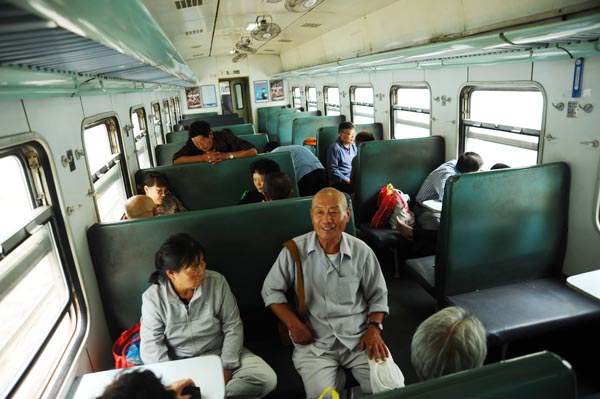Slow trains boost local incomes


Train No 4319 stops at the Shicheng station for about 17 minutes. The stop is long enough to allow some nearby farmers to carry their goods onboard.
Inconvenient transportation once hampered the economies of many villages in Shicheng, a township in Fengcheng, Liaoning province.
But the situation has improved since the slow-train service started in 2012.
"There are only three ways out of the village. One is a winding foot path in the village, the second is a mountain trail behind the village and the third is the train," says Wang Yunlong, who has lived in Shicheng for more than 60 years.
"Thanks to this small, slow train, we can sell goods produced in our village to the outside world and make more money."
The train runs for 321 kilometers between Tonghua and Dandong cities, completing the journey in six hours and 17 minutes.
The 17-minute stop at the station has put Shicheng's villagers' lives on the fast track.
They pick seasonal wild plants, yams, walnuts, mushrooms and other mountain products, and take the train to sell them elsewhere.
Liu Ende plants corn, soybeans and other crops on less than 1 hectare of land. He used to earn 10,000 yuan ($1,530) a year from his plot, but the train had helped to boost his income.
Now, the 74-year-old has a profitable sideline selling his products. In his spare time, Liu climbs the mountains to pick wild edibles and sells them in the city on weekends.
"I set out in the morning to sell mountain products and return home at night. I can earn more than 200 yuan," says Liu.
"Walnuts and hedgehog mushrooms are the most popular. I earned over 10,000 yuan from them last year."
For some villagers along the railway line, the train is the only way to communicate with the outside world when the mountains are snowbound in winter.
"One year, our village was cut off by heavy snow for more than a month. But thankfully, meat and vegetables were brought in by the train," says Ye Wei, who lives along the railway in Fengcheng.
"We don't have a school in our village. Children have to go to other places for education, and the train is their only way to travel. Every weekend, the children travel home by train. If we hear the train whistle, it means the kids are back," says Liu.
The train provides transport for more than 1,200 children along the route. Since it started, 132 high school graduates have been admitted to university.
Tourism has also boosted the local economy, as tourists can take the train to nearby scenic spots and enjoy local food.
There are more than a dozen pairs of "slow trains" like this operated by China Railway Shenyang Bureau Group.
"Slow trains are necessary amid high-speed rail development because they make many stops along the rails," says Li Xiangjun, chief conductor of train No 4319.
"This accommodates people in poor areas and helps improve their situations."




































